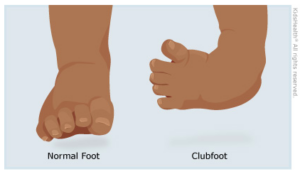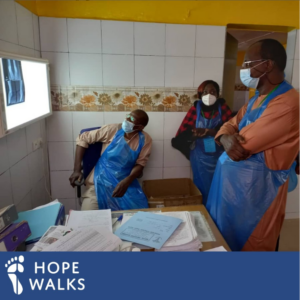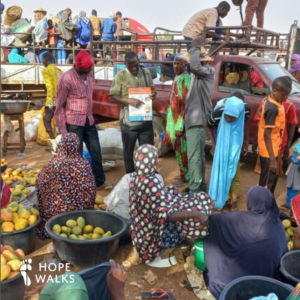January is Human Trafficking Prevention Month: Part 2 By: Justice Venture International [As we start the new…
The Professionals Behind Treating Clubfoot
June 3 is World Clubfoot Day. This is a day for raising awareness about the need for clubfoot treatment for children who do not have access to a basic correction of their feet which can save a lifetime of disability.
 Last year we wrote about the basics of clubfoot and the plight of children born with the condition. As a Foundation, we have a commitment to serve these children, particularly in Ethiopia where the Foundation partners with Hope Walks in an effort to reach 70 percent of new cases of clubfoot and provide treatment for these children before the age of two.
Last year we wrote about the basics of clubfoot and the plight of children born with the condition. As a Foundation, we have a commitment to serve these children, particularly in Ethiopia where the Foundation partners with Hope Walks in an effort to reach 70 percent of new cases of clubfoot and provide treatment for these children before the age of two.
Serving children with disabilities requires skilled healthcare professionals and social workers, and so this year we call attention to the professionals who deliver the treatment and support services that can change a child’s life.
The primary treatment provider is a physiotherapist who is trained to address orthopedic conditions and work with patients to “help them manage pain, balance, mobility, and motor function.”[i]

The Ponseti Method (Photo Credit: Hope Walks).
Physiotherapists treat clubfoot in young children with a proven treatment method call the Ponseti Method. “The treatment is based on a sound understanding of the functional anatomy of the foot and of the biological response of muscles, ligaments and bone to corrective position changes gradually obtained by manipulation and casting.”[ii]

These medical professionals in Burkina Faso are discussing clubfoot cases. This was part of an advanced training practical session at the Hope Walks partner clinic at Schiphra Hospital (Photo Credit: Hope Walks Instagram).
The Ponseti method requires a specialized understanding of the treatment technique. The Africa Clubfoot Treatment Project was a collaboration (2015-2017) between Nuffield Department of Orthopedics, Rheumatology and Musculoskeletal Sciences from Oxford University’s Medical Services Division and CURE International, which resulted in Basic and Advanced Clubfoot Treatment Provider Courses.[iii] These courses are used by Hope Walks to train national clinicians at medical facility partners in Ethiopia and other countries. The training of new physiotherapists is vitally important in order for the Ponseti Method to reach all children in need. A 2020 census suggested that there are just over 21,000 physiotherapists across all of Africa.[iv] Many more of these heroes in care are needed.
In addition to physiotherapists, social workers, or parent advisors, are required for successful clubfoot treatment. In developing countries supporting families is as important as clinical intervention, and social workers serve this critical role through encouragement and problem solving.
Clubfoot treatment requires between four to eight weekly visits to the physiotherapist for casting. This is challenging for families, especially those from rural areas. Social workers help with transportation and lodging for these visits. When the casting is complete, the child is fitted with a brace to hold the correction. This requires discipline on the part of families, which social workers can help with to ensure the brace is maintained in place for the treatment period.

Parent advisors in Niger are taking steps in raising clubfoot awareness by presenting Hope Walks treatment programs in local markets (Photo Credit: Hope Walks Instagram).
Many families need encouragement in the treatment of their children as there is often misunderstanding about the nature of clubfoot and who is responsible for children having the condition. Social workers can bring understanding and hope to these families. Most importantly, families can be spiritually encouraged and helped in recognizing that God’s love is infinite, and is especially extended to children with disabilities. The Foundation supports Hope Walks and CURE International, and both are strong witnesses of God’s love in the midst of disabilities.
As we recognize the need to raise awareness about clubfoot, we equally celebrate these who work to deliver the cure from clubfoot that we desire for children.
[i] https://www.webmd.com/a-to-z-guides/what-is-a-physiotherapist
[ii] https://www.physio-pedia.com/Ponseti_method#cite_ref-:0_6-0
[iii] https://www.ndorms.ox.ac.uk/research/research-groups/global-surgery/projects/africa-clubfoot-training-act#:~:text=The%20Africa%20Clubfoot%20Training%20(ACT,treatment%20in%20sub%2DSaharan%20Africa.
[iv] https://world.physio/sites/default/files/2020-12/2020-amc-kenya.pdf
Share this post:
Category: Original Content
January is Human Trafficking Prevention Month: Part 1 By Shellie Velasco, Program Officer [As we start the…
Welcome to 2025 By Adrian Cook, Director of Research & Evaluation “But the steadfast love of the…

